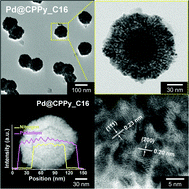Porous palladium coated conducting polymer nanoparticles for ultrasensitive hydrogen sensors†
Abstract
Hydrogen, a clean-burning fuel, is of key importance to various industrial applications, including fuel cells and in the aerospace and automotive industries. However, hydrogen gas is odorless, colorless, and highly flammable; thus appropriate safety protocol implementation and monitoring are essential. Highly sensitive hydrogen leak detection and surveillance sensor systems are needed; additionally, the ability to maintain uniformity through repetitive hydrogen sensing is becoming increasingly important. In this report, we detail the fabrication of porous palladium coated conducting polymer (3-carboxylate polypyrrole) nanoparticles (Pd@CPPys) to detect hydrogen gas. The Pd@CPPys are produced by means of facile alkyl functionalization and chemical reduction of a pristine 3-carboxylate polypyrrole nanoparticle-contained palladium precursor (PdCl2) solution. The resulting Pd@CPPy-based sensor electrode exhibits ultrahigh sensitivity (0.1 ppm) and stability toward hydrogen gas at room temperature due to the palladium sensing layer.


 Please wait while we load your content...
Please wait while we load your content...